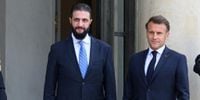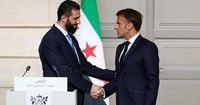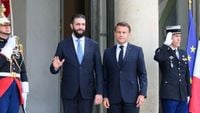The recent meeting between French President Emmanuel Macron and interim Syrian President Ahmed al-Chareh at the Élysée has ignited a political firestorm in France, drawing sharp criticism from various factions. On May 7, 2025, Macron welcomed al-Chareh, a controversial figure due to his past as a jihadist and his role in the Syrian conflict, which has left the country in ruins.
During their two-hour meeting, Macron defended the necessity of engaging with al-Chareh, stating, "What would diplomacy be if we only received those with whom we completely agree?" He emphasized that France has interests in Syria that need to be safeguarded, despite the moral complexities involved in dealing with a leader who has a history of extremism.
Macron's position comes as he aims to advocate for lifting European sanctions against Syria, which have been in place for years due to the ongoing civil war and human rights violations. He indicated that he would push for this during the upcoming meeting of the 27 member states of the European Union on June 1, 2025. "I think it is our responsibility to lift these sanctions," he stated, highlighting the need for Syria to recover from over a decade of devastating conflict.
However, Macron's invitation to al-Chareh has not been without backlash. Nicolas Dupont-Aignan, president of the political party Debout la France, reacted strongly, declaring on CNEWS that "Emmanuel Macron deserves impeachment" for his decision to meet with the Syrian leader. This sentiment reflects a broader discontent among right-wing and far-right factions, who view the meeting as a betrayal of France's values and a dangerous precedent.
Macron's assurance that he would hold al-Chareh accountable is critical. He reminded the Syrian president of the need to protect all Syrians, regardless of their background, and to ensure that those responsible for recent massacres, particularly against the Alawite minority, are prosecuted. "I insisted that he must do everything to ensure the protection of all Syrians without exception," Macron stressed.
Al-Chareh, for his part, expressed solidarity with the victims of terrorism and assured Macron that he would ensure the safety of foreign jihadists currently in Syria. This includes a significant number of individuals from various countries, including France, who have been implicated in the conflict. He did not rule out the possibility of granting them Syrian nationality if the future constitution allows it.
The backdrop of this meeting is a complex and bloody history. Al-Chareh, who has been described as a former jihadist, previously founded the Front al-Nosra, which is affiliated with Al-Qaeda. His rise to power has been marked by violence, and many fear that his leadership could lead to further oppression and suffering for the Syrian people.
Critics of the meeting have drawn parallels to past diplomatic overtures to authoritarian regimes, recalling how in 2008, then-President Nicolas Sarkozy welcomed Bashar al-Assad to France under the guise of fostering constructive dialogue. This invitation was later condemned as naive, especially after the brutal crackdown on protests in Syria that began in 2011.
Al-Chareh's government has been accused of exacerbating the suffering of minorities in Syria, and reports indicate that thousands have been killed in recent months due to sectarian violence. According to the Syrian Observatory for Human Rights (OSDH), at least 745 Alawite civilians were killed between March 6 and March 8, 2025, alone. The situation for other minorities, including the Druze and Christians, remains precarious, with many fearing for their lives under the new regime.
Macron's approach has sparked a debate about the moral implications of engaging with leaders who have a history of violence and extremism. Some argue that dialogue is necessary to stabilize the region and prevent further humanitarian crises, while others believe that it legitimizes oppressive regimes.
In a joint press conference following their meeting, Macron reiterated that France's support would be contingent on al-Chareh's actions regarding human rights and the safety of all Syrians. "If actions do not follow words, we will reassess our position," he warned.
The international community is watching closely as Macron navigates this contentious diplomatic landscape. His administration's efforts to reshape France's role in the Middle East could have far-reaching consequences, particularly as the situation in Syria continues to evolve.
As the French government prepares to advocate for lifting sanctions, the question remains whether this strategy will lead to a more stable Syria or simply enable further abuses under al-Chareh's rule. The stakes are high, and the path forward is fraught with challenges.
In conclusion, Macron's meeting with al-Chareh represents a significant moment in French foreign policy, one that could redefine relations with Syria and impact the broader geopolitical landscape in the region. As the debate continues, the voices of those affected by the conflict remain at the forefront, reminding the world of the urgent need for justice and accountability in Syria.






